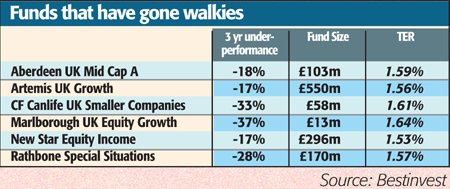It’s a dog’s life for far too many funds
The latest list of 'dog' funds - those which have underperformed its benchmark by at least 10% over three years - is double what it was for 2006. So which funds are the worst offendors?

Get the latest financial news, insights and expert analysis from our award-winning MoneyWeek team, to help you understand what really matters when it comes to your finances.
You are now subscribed
Your newsletter sign-up was successful
Want to add more newsletters?

Twice daily
MoneyWeek
Get the latest financial news, insights and expert analysis from our award-winning MoneyWeek team, to help you understand what really matters when it comes to your finances.

Four times a week
Look After My Bills
Sign up to our free money-saving newsletter, filled with the latest news and expert advice to help you find the best tips and deals for managing your bills. Start saving today!
Most professional fund managers can't have been terribly pleased when Jayesh Manek arrived on the scene in 1997. The West London chemist had effectively won a job in the City in a competition, receiving backing for his own fund from enthusiastic investors after winning a Sunday Times fantasy portfolio contest for two years in a row in the mid-1990s.
So there must have been more than a hint of malicious pleasure from some when his fund, Manek Growth, promptly lost a lot of money after following precisely the strategy that had won him the portfolio competitions betting heavily on booming technology stocks.
But it seems Manek is now back on his competition-winning form. The Manek Growth fund has returned an impressive 12.1% over the past 12 months, easily trouncing the loss of 8% posted by the average fund in the UK All Companies sector. Manek says the past year's performance is part of a new, consistent trend. He tells The Mail on Sunday that "I overhauled my investment process, analysing my trading records to see what was working".
MoneyWeek
Subscribe to MoneyWeek today and get your first six magazine issues absolutely FREE

Sign up to Money Morning
Don't miss the latest investment and personal finances news, market analysis, plus money-saving tips with our free twice-daily newsletter
Don't miss the latest investment and personal finances news, market analysis, plus money-saving tips with our free twice-daily newsletter

Financial adviser Bestinvest's latest list of dog' funds shows that many fund managers would be well advised to do the same. Manek is no stranger to the dogs' list, having been on it for five years in a row up until 2005. And to qualify as a dog', a fund really does have to be bad. It must have underperformed its benchmark in each of the past three years, and have done so by at least 10%. Sadly, this year's list was not short of names Bestinvest labelled 70 unit trusts as dogs', double the number in January 2006.
The fund management group with the biggest kennel is Schroders, with £1.2bn of assets in dog funds. Scottish Widows is close behind with £778m, and Fidelity next on £733m, as the latter's UK growth fund continued to perform poorly following three changes of manager in just two years. History suggests that investors should favour managers with "existing track records of adding value in this sector", says Stephen Marriott of Bestinvest in The Sunday Telegraph something that perhaps investors should have noted in 1997, when they queued up to give money to a chemist with only paper experience of stock trading.
Despite the upturn in Manek's fortunes since then, if you are going to buy into a UK companies fund, then we'd be more inclined to take a look at Standard Life UK Smaller Companies. According to Bestinvest, the fund has outperformed its benchmark by 38% over three years, and comes top of their best in show' awards, for funds that have beaten their benchmarks by at least 10% over the past three years.
Get the latest financial news, insights and expert analysis from our award-winning MoneyWeek team, to help you understand what really matters when it comes to your finances.
Jody studied at the University of Limerick and was a senior writer for MoneyWeek. Jody is experienced in interviewing, for example digging into the lives of an ex-M15 agent and quirky business owners who have made millions. Jody’s other areas of expertise include advice on funds, stocks and house prices.
-
 How to navigate the inheritance tax paperwork maze in nine clear steps
How to navigate the inheritance tax paperwork maze in nine clear stepsFamilies who cope best with inheritance tax (IHT) paperwork are those who plan ahead, say experts. We look at all documents you need to gather, regardless of whether you have an IHT bill to pay.
-
 Should you get financial advice when organising care for an elderly relative?
Should you get financial advice when organising care for an elderly relative?A tiny proportion of over 45s get help planning elderly relatives’ care – but is financial advice worth the cost?
